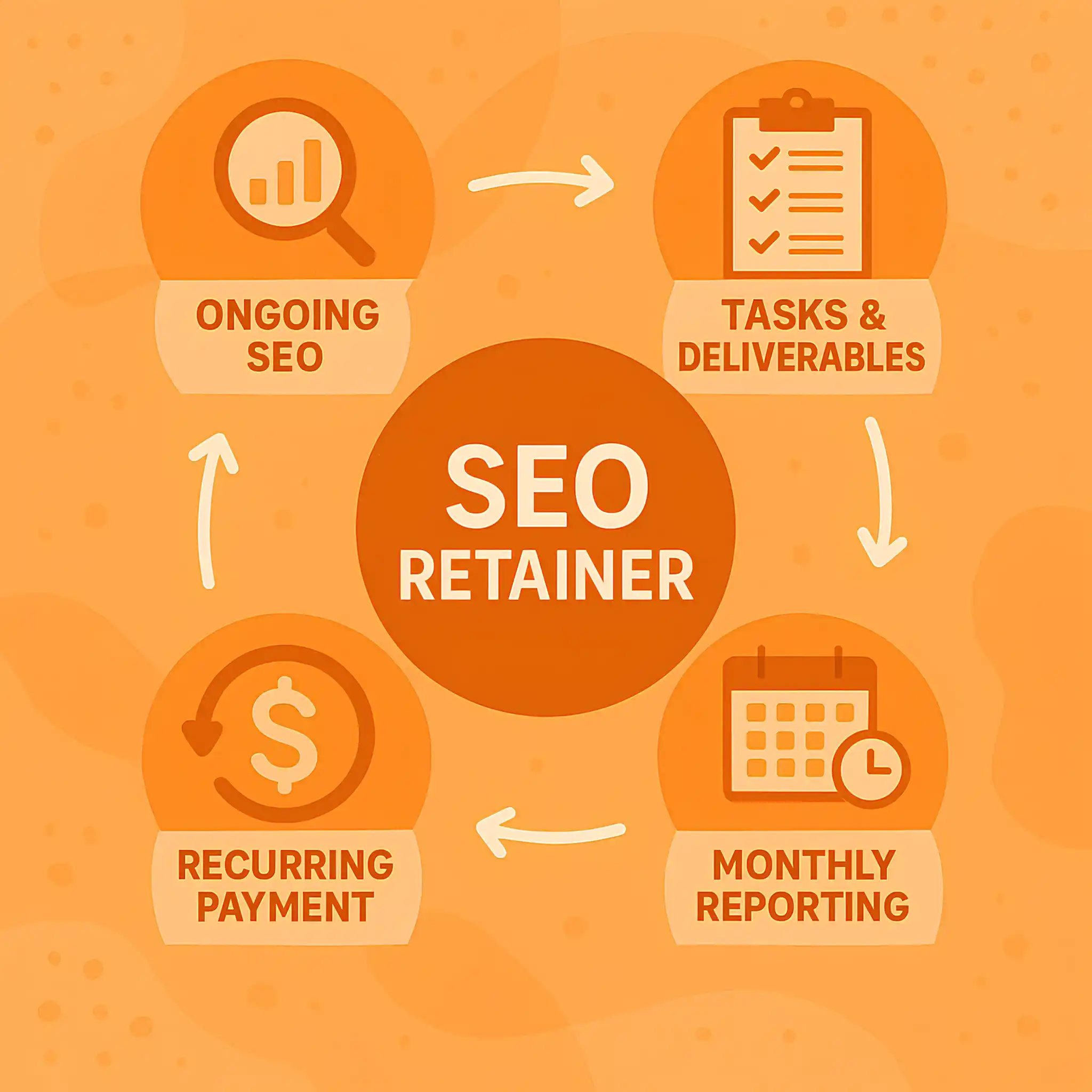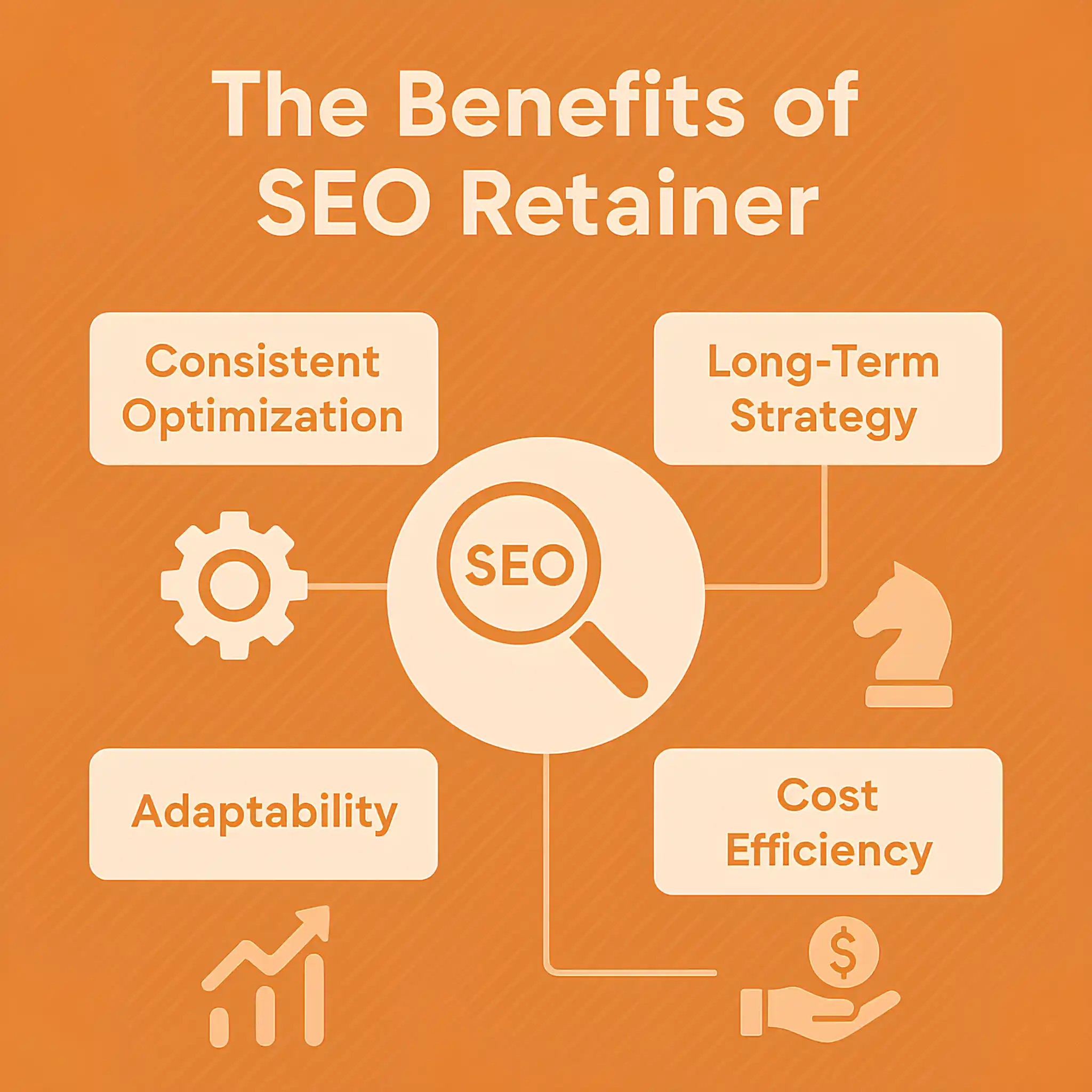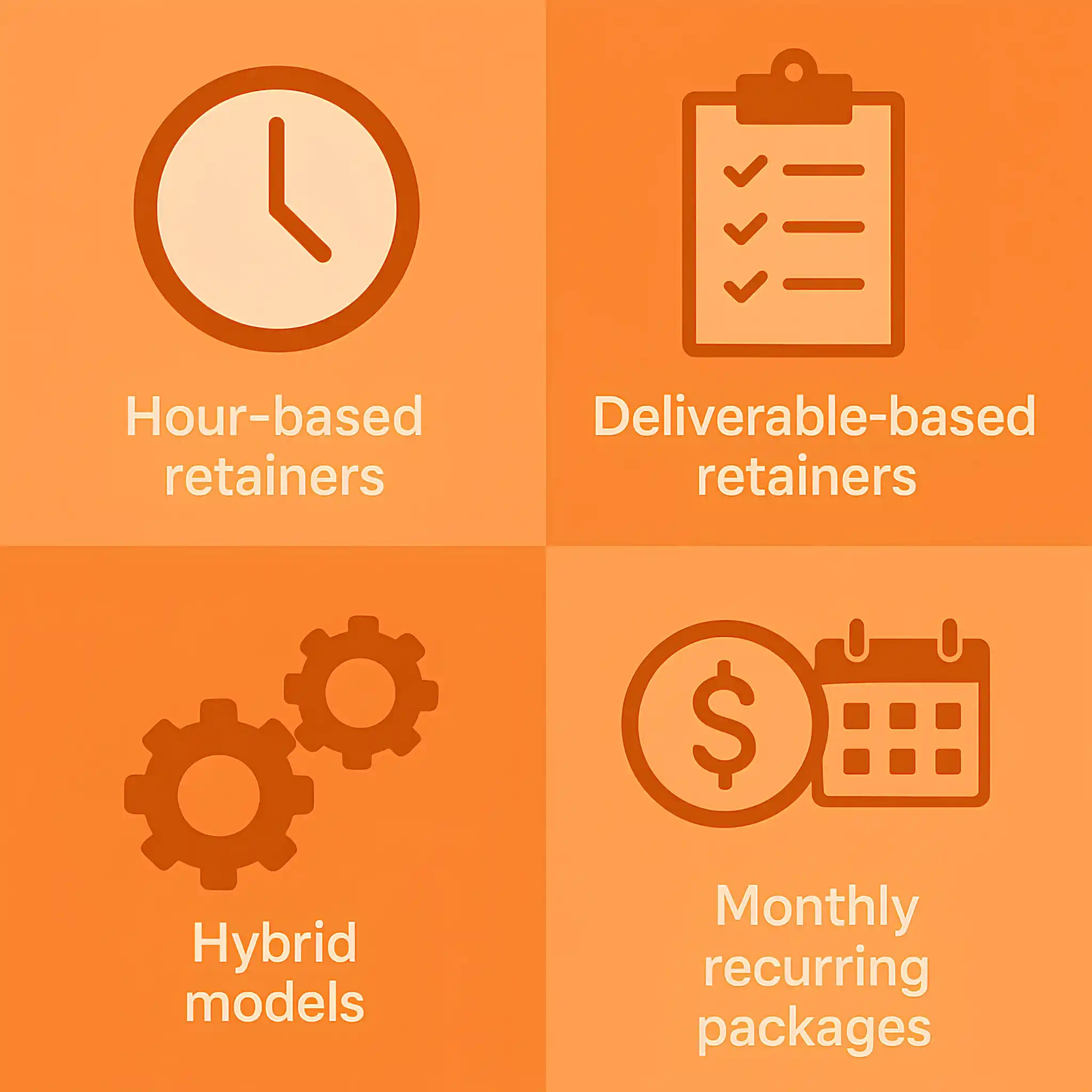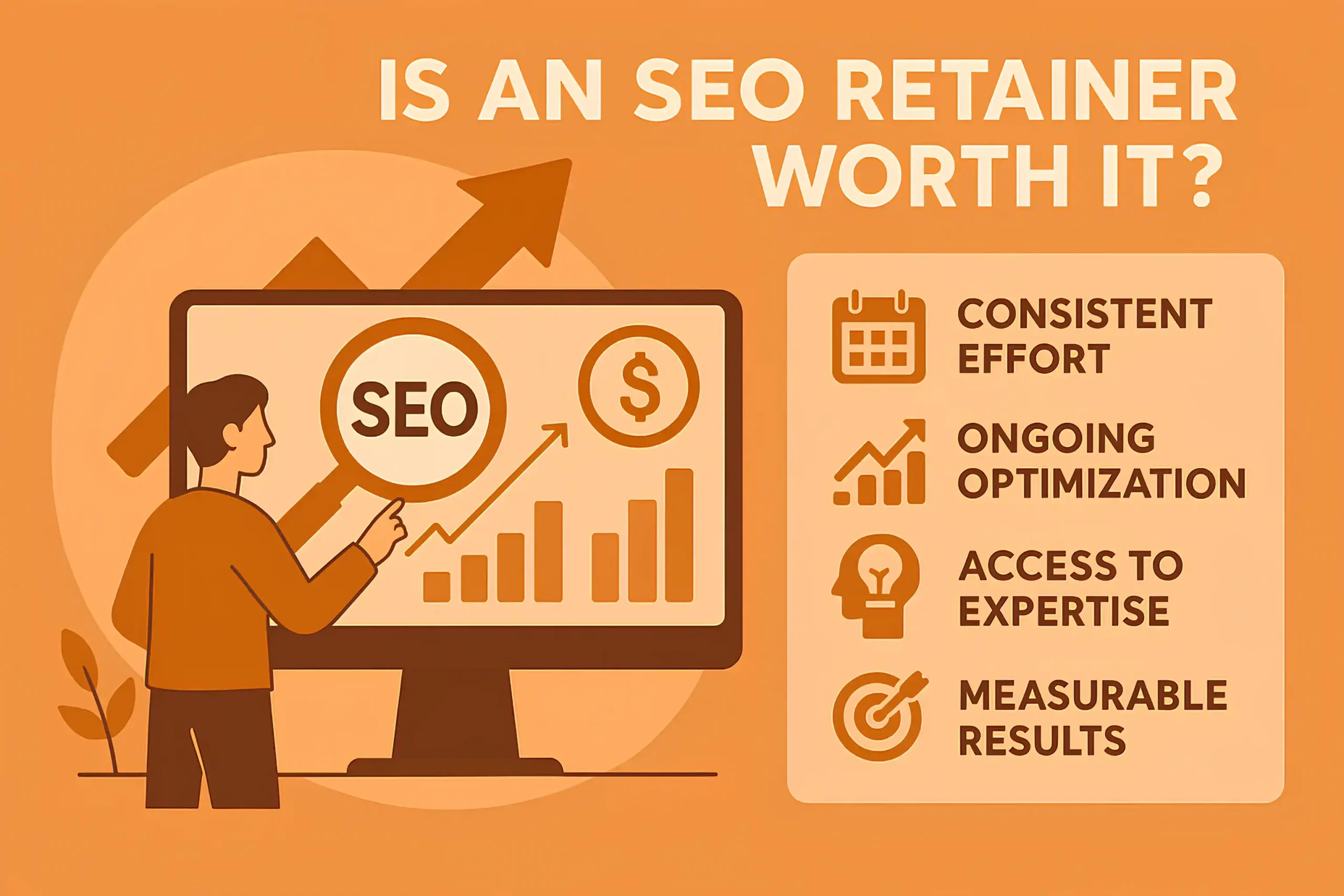Updated January 11, 2026
What Is an SEO Retainer? A Complete Guide for 2026
If you’re looking for consistency, structure, and long-term planning, an SEO retainer might be exactly what your strategy is missing. If you’ve ever felt like you’re doing everything right but still not seeing long-running results, this is likely the piece that brings it all together.
In this guide, I’ll explain exactly what an SEO retainer is, how it works, who it’s best suited for, and why it’s become the go-to model for serious brands. I’ve worked with startups and enterprise clients under retainers, and I’ll share my insights on what makes this model work and when it doesn’t.
Whether you’re considering hiring an SEO agency or you’re just curious how the retainer model compares to project-based work, you’ll walk away with answers. Let’s get into it.
What Is an SEO Retainer?
An SEO retainer is an ongoing partnership where you pay a monthly fee for continuous SEO support, not just random tasks, but a strategy that adapts and evolves with your business.

Instead of hiring an SEO agency or someone to fix one problem at a time, you’re bringing in an expert (or team) to monitor, maintain, and grow your organic presence month after month. It’s not about “buying backlinks” or “doing SEO” once; it’s about having someone who’s in your corner long-term, spotting issues before they happen, building on what’s working, and adjusting as search engines change.
Here is what an SEO retainer typically includes:
- Strategy development
- On-page optimization
- Content strategy and creation
- Link-building
- Technical audits
- Reporting and analytics
- Priority support and SEO consulting
The Benefits of an SEO Retainer
I believe there are many benefits. For instance, with a monthly SEO retainer, you’re not resetting the strategy every few months or switching hands between freelancers or SEO coaches. You’re building on what works, learning from what doesn’t, and growing your gains over time.
Another great benefit is that a retainer gives you more than consistent work; it gives you access. You’re not waiting in a queue for someone to fix your SEO issue “when they get to it.” You get faster turnarounds, clearer communication, and a dedicated team that knows your site inside and out.

Finally, with a retainer, your SEO team is learning your business, your customers, and your voice. That long-term relationship leads to smarter, more targeted decisions. Whether you’re launching a new product, entering a new market, or adjusting your messaging, your SEO strategy changes with you.
It also allows for tighter integration with your internal marketing team, aligning SEO with content, paid media, PR, and even sales initiatives for better overall performance.
Types of SEO Retainers
I’ve worked with brands that preferred accurate hourly tracking, others that thrived on deliverable-focused work, and some that needed a hybrid because nothing else made sense. The key is knowing what each model offers and where it can fall short before you commit. Let’s break down the four common types I personally tried.

Hour-Based Retainers
This is your classic time-tracking setup. You agree on a set number of hours each month, and everything: strategy calls, audits, updates, comes from that bank.
- Flexible to client needs
- Transparent billing structure
- Easier to adjust work scope
- Suitable for short-term projects
- Difficult to predict total cost
- Can lead to inefficiency
- May limit long-term strategy focus
- Not ideal for large projects
Best for: Businesses that need consistent SEO input but have changing needs. If you’re the kind of company that wants control over task allocation, this model gives you room to breathe.
Deliverable-Based Retainers
Here, you pay for specific deliverables; say, four blog posts, a technical audit, and 10 backlinks per month. It’s results-focused and straightforward.
- Clear scope of work
- Predictable pricing
- Easier to track progress
- Focus on specific results
- Limited flexibility
- Potential for underperformance
- Risk of over-promising
- Can restrict creative strategies
Best for: Companies that value predictability. If you’ve already crafted your strategy and just need execution, this option keeps everything streamlined.
Hybrid Models
This is where things get interesting. A hybrid retainer combines hours and deliverables. For example, you might have 10 fixed deliverables and 10 flexible hours for consultations or emergencies.
- Combines flexibility with structure
- Provides a balance of fixed and variable costs
- Enables scalability as client requirements change
- Can be complex to manage and price
- May require more frequent client communication
- Less predictability in revenue stream
Best for: Growth-stage businesses or scaling startups. If you’re still shaping your SEO roadmap and want consistent execution and strategic agility, this is a good option.
SEO Retainer Price Ranges
| Retainer Type | Scope of Work | Monthly Price Range | Typical Client Type |
|---|---|---|---|
| Basic Retainer | Local SEO, Small Site Updates | $500 – $1,500 | Small Businesses, Startups |
| Standard Retainer | On-Page, Technical SEO, Link Building | $1,500 – $3,000 | Growing SMBs, Mid-Sized Sites |
| Advanced Retainer | Full SEO Campaigns, Content Strategy | $3,000 – $7,000 | National Brands, SaaS Companies |
| Enterprise Retainer | Multi-Site SEO, Custom Solutions | $7,000 – $15,000+ | Large Enterprises, Corporations |
| International Retainer | Multi-language SEO, Hreflang, Global | $5,000 – $20,000+ | Global Brands, International |
The cost of an SEO retainer can vary widely, and it’s not just about hours worked; it’s about the depth of strategy, scope of work, and the resources required to get real results. Here are the top factors that typically determine pricing:
Website Size and Complexity: A small brochure site is easier to manage than a large eCommerce platform with thousands of pages. The more pages, templates, and technical issues involved, the more time and expertise are needed each month.
Competition Level in Your Niche: If you’re in a highly competitive space like finance, law, or SaaS, it takes more strategic effort, stronger content, and higher-quality backlinks to break through; all of which drive up the retainer cost.
Geo-Targeting Requirements: Targeting multiple cities, regions, or countries adds extra levels of SEO work, from localized content to regional keyword research and citation building. More locations mean more complexity.
Number of Services Included: Some retainers focus purely on technical audits and on-page optimization, while others include content creation, digital PR, link-building, and CRO support. The more services are covered, the higher the cost.
Frequency of Reporting and Strategy Calls: More frequent meetings, detailed custom reports, and ongoing collaboration require more involvement from the SEO team, which also influences monthly pricing.
Is It Worth the Price?
In most cases, yes, if you’re working with the right partner. What you’re paying for is access to expertise, proven systems, and relationships that would take years to build on your own. You’re hiring someone who doesn’t just know how SEO works, but knows how to apply it to your business, adapt to algorithm changes, and deliver consistent growth over time.
Compared to hiring in-house, a retainer often gives you more value at a lower cost. A full-time SEO specialist with solid experience can cost $60K–$100K+ per year, and they may still need support with content, link-building, or technical work.

A retainer brings a team of specialists: strategists, writers, and outreach experts under one roof, without the overhead of recruitment, management, or training.
Unlike one-off SEO gigs, a retainer gives you consistent progress. Issues are caught early, opportunities are acted on fast, and your site doesn’t stay inactive while rankings decline. So while it’s not considered affordable SEO, a strong SEO retainer is often one of the smartest long-term marketing investments a company can make.
What Makes a Great SEO Retainer Agreement?
This is a very hard question, but let me tell you what I think as the CEO and Founder of Digital World Institute. First of all, a strong SEO retainer agreement sets expectations clearly: no guessing, no empty promises. It should outline the scope of work in detail: what’s included each month (e.g., audits, content, outreach), and what’s not.
Great SEO agencies don’t need to lock you into long-term contracts to prove their value. You should be able to reassess the partnership with reasonable notice. Finally, well-drafted payment terms and late fee policies protect both sides and keep things professional. If it’s not written down, it doesn’t count.
Red Flags to Watch For
If an agency promises to “rank you #1 in 30 days,” walk away. Overpromising rankings is one of the biggest signs they’re focused on short-term wins or cutting corners. A great retainer is built on transparency, not guarantees that no one can control.
If you’re not sure what you’re getting month to month, that’s a red flag. The same goes for hidden costs or scope creep. You should never be surprised by invoices for work you didn’t approve. A proper SEO retainer protects you from these headaches and sets the foundation for a real partnership.
Who Should (and Shouldn’t) Use SEO Retainer Services?
SEO retainer services are ideal for businesses that rely on consistent, long-term organic growth, not just a short-term traffic boost. SaaS companies, B2B service providers, eCommerce brands, and content-heavy websites benefit the most because they need ongoing optimization, content, and link-building strategies to stay competitive.
Retainers are also a smart choice for brands with long sales cycles, especially for B2B SEO, where visibility, authority, and lead development matter more than short-term wins. These businesses often need deeper integration between SEO and their broader marketing strategy, something that only a retainer model can truly support.
Who Might Not Need One Yet?
If you’re a very early-stage startup still validating your offer or building your first site, committing to a monthly SEO retainer might be premature. You’re better off investing in foundational work: a solid site structure, keyword research, and maybe a one-time SEO audit.
The same goes for businesses that only need a technical cleanup or migration assistance. In those cases, a project-based SEO engagement is more efficient. A retainer makes sense once you’re ready for consistent growth, content development, and strategic guidance, not just a quick fix.
Retainer vs. Performance-Based SEO Models
| Aspect | Retainer SEO Model | Performance-Based SEO Model | Notes |
|---|---|---|---|
| Payment Structure | Fixed monthly fee | Pay based on results achieved | Retainer offers predictability, performance-based is outcome-driven. |
| Risk Distribution | Shared risk between agency and client | Higher risk for agency | Performance-based models shift risk onto the agency. |
| Focus | Long-term strategy and growth | Short-term wins and visible KPIs | Retainers favor sustainable growth. |
| Best Fit For | Businesses seeking steady, scalable SEO | Businesses demanding immediate measurable returns | Retainers suit long-term brand building better. |
How Long Should I Commit to an SEO Retainer?
A typical SEO retainer requires at least a 3 to 6-month commitment to see meaningful progress. SEO takes time, it’s not like paid ads, where results are instant. You need time for audits, strategy development, implementation, content creation.. If you quit too soon, you risk missing the building effects that SEO brings over time. That said, long-term engagements (6–12 months) usually bring the best ROI, especially in competitive niches. The key is to work with a provider who offers monthly reviews so you can evaluate performance as you go.
Can I Cancel My SEO Retainer at Any Time?
I think it depends on the agreement, but most retainers come with a notice period, typically 15 to 30 days. This allows the agency to wrap up deliverables and gives you time to assess next steps. Many providers avoid long lock-in contracts, but it’s still important to clarify the exit terms upfront.
Look for flexible arrangements that prioritize performance and transparency. If the contract has hidden penalties or long-term obligations with no exit ramp, that’s a red flag. A good SEO partner won’t force you to stay, they’ll earn it month after month.
What If I Don’t See Results After a Few Months?
SEO isn’t instant, but if you’re not seeing any movement after 3–4 months, it’s fair to start asking questions. First, consider the niche: high-competition industries naturally take longer. But beyond that, your provider should be able to show progress, even if it’s not traffic yet.
Are rankings improving? Are technical issues resolved? Has content been optimized and published? If the answer is yes, you may just need more time. If there’s silence or uncertain updates, it may be time to reconsider the partnership.
Can an SEO Retainer Include PPC and Other Services?
Yes, many SEO retainers can be expanded to include PPC, content marketing, CRO, or even email strategy, depending on the agency’s capabilities. However, combining services often changes pricing and scope. Make sure your agreement clearly defines what’s included, how time is allocated, and who’s handling what.
Some agencies offer hybrid retainers with flexible hours across services, while others prefer separate retainers for SEO and PPC. Either way, the key is clarity.
What’s the Difference Between a Freelancer and an Agency Retainer?
A freelancer retainer usually gives you access to one expert handling everything, which can work well for smaller sites or simpler needs. An agency retainer, on the other hand, brings a team: strategists, content writers, outreach specialists, and technical SEOs. That means broader skill sets, faster execution, and more scalability.
However, agencies are typically more expensive. Freelancers may offer more flexibility, while agencies bring structure, systems, and capacity. The right choice depends on your goals, budget, and how hands-on you want your SEO partner to be.
Is a Custom SEO Retainer Better Than a Package?
In most cases, yes. Custom SEO retainers are built around your business objectives, your current SEO health, and the resources needed to move forward. Packages can be convenient, but they often take a one-size-fits-all approach, which rarely delivers optimal results, especially in competitive industries.
A custom retainer makes sure you’re not paying for what you don’t need or skipping over what’s essential. It also makes room for flexibility, allowing the strategy to evolve as your business grows. If you want serious results, a customized approach will always outperform cookie-cutter packages.
Do SEO Retainers Guarantee Rankings?
No credible SEO professional will ever guarantee rankings, and if they do, that’s a red flag. Search engines are unpredictable, and no one has direct control over how Google ranks content. That said, a solid SEO retainer should guarantee deliverables, transparency, and strategic focus.
You should expect clear communication, progress tracking, and improvements over time. Rankings are often a byproduct of doing the right things consistently, not something that can be promised upfront. Focus on long-term visibility, traffic growth, and conversions instead of ranking guarantees.
How Do I Track ROI From an SEO Retainer?
Tracking ROI starts with defining what “return” means for your business. Is it leads? Sales? Traffic? Your SEO provider should set up proper tracking through Google Analytics, GSC, and conversion tools to tie organic efforts to business outcomes.
Monthly reports should show how rankings, traffic, and conversions evolve over time. You can also measure SEO ROI by comparing the cost of the retainer to the value of leads or revenue driven from organic search.
Keep in mind, SEO often brings delayed but long-lasting returns.
Can I Scale Up/Down My Retainer Over Time?
Yes, and a good SEO provider will encourage that flexibility. Your business goals may change, and your SEO needs should follow. You might start with a smaller retainer focused on technical fixes and keyword research, then scale up once you’re ready to invest in content and outreach.
On the other hand, if your strategy changes or you reach a maintenance phase, you can scale down while still keeping key tasks covered. Just make sure this flexibility is written into your agreement, so there are no surprises when you want to adjust scope or budget.
Should I Ask for a Trial Period First?
It’s a fair request, especially if you’re entering a new relationship. Some agencies offer paid trial periods, usually 30 days, to let you evaluate their processes, communication, and early performance.
This isn’t about instant results, but about seeing how the team works, how fast they execute, and how transparent they are. A trial also helps both sides assess fit.
Just avoid free trials; quality SEO work requires time, research, and strategy. A paid trial shows mutual respect and sets the tone for a serious, long-term partnership.
What if We Don’t Need SEO Every Single Month?
If ongoing SEO doesn’t align with your current needs or budget, you might consider no-contract SEO, which gives you more flexibility. It allows you to focus on specific tasks or sprints, like an audit, technical cleanup, or content revamp, without locking into a long-term retainer.
Another smart alternative is working with a fractional SEO consultant. This is perfect if you want senior-level strategy and support without the cost of a full-time hire. It works well for companies that already have internal resources but need expert guidance to keep everything on track, review key changes, and steer the roadmap quarterly.
Should Startups Invest in an SEO retainer?
Absolutely, an SEO retainer can be one of the smartest long-term investments a startup makes. Early-stage companies benefit greatly from consistent SEO support, especially when trying to establish authority, capture early organic traffic, and avoid costly mistakes that are hard to fix later.
I mean, if you’re just getting started and uncertain about your market, budget, or growth path, it’s wise to begin with an SEO consultant. A consultant can assess your competition, identify your best organic opportunities, and help you understand whether an SEO retainer is a logical next step. In many cases, they’ll even help define the exact scope of work needed so you know where your money will go, and what returns to expect.
Is It Worth It to Keep an SEO Retainer if Your Rankings Are Stable?
Yes, and here’s why: SEO is never a “set it and forget it” game. Even if your rankings are currently stable, Google rolls out algorithm updates multiple times a year; some of which can dramatically shift the search landscape. On top of that, competitors are constantly optimizing, new pages are published daily, and user behavior evolves.
If you pause your SEO efforts, especially link building, content updates, or technical maintenance, you risk losing the progress you’ve built. That doesn’t mean you always need the same aggressive scope of work. You might scale down or shift focus to maintenance and content refinement, but staying active is essential if you want to keep what you’ve earned.
Do SEO Retainers Also Include AI-Powered SEO Services?
Yes, especially with modern SEO evolving rapidly, a reliable SEO agency today should include AI-powered SEO services as part of their monthly retainers. This might involve using AI tools for content creation, keyword clustering, SERP analysis, predictive SEO, and workflow automation to increase efficiency and performance.






